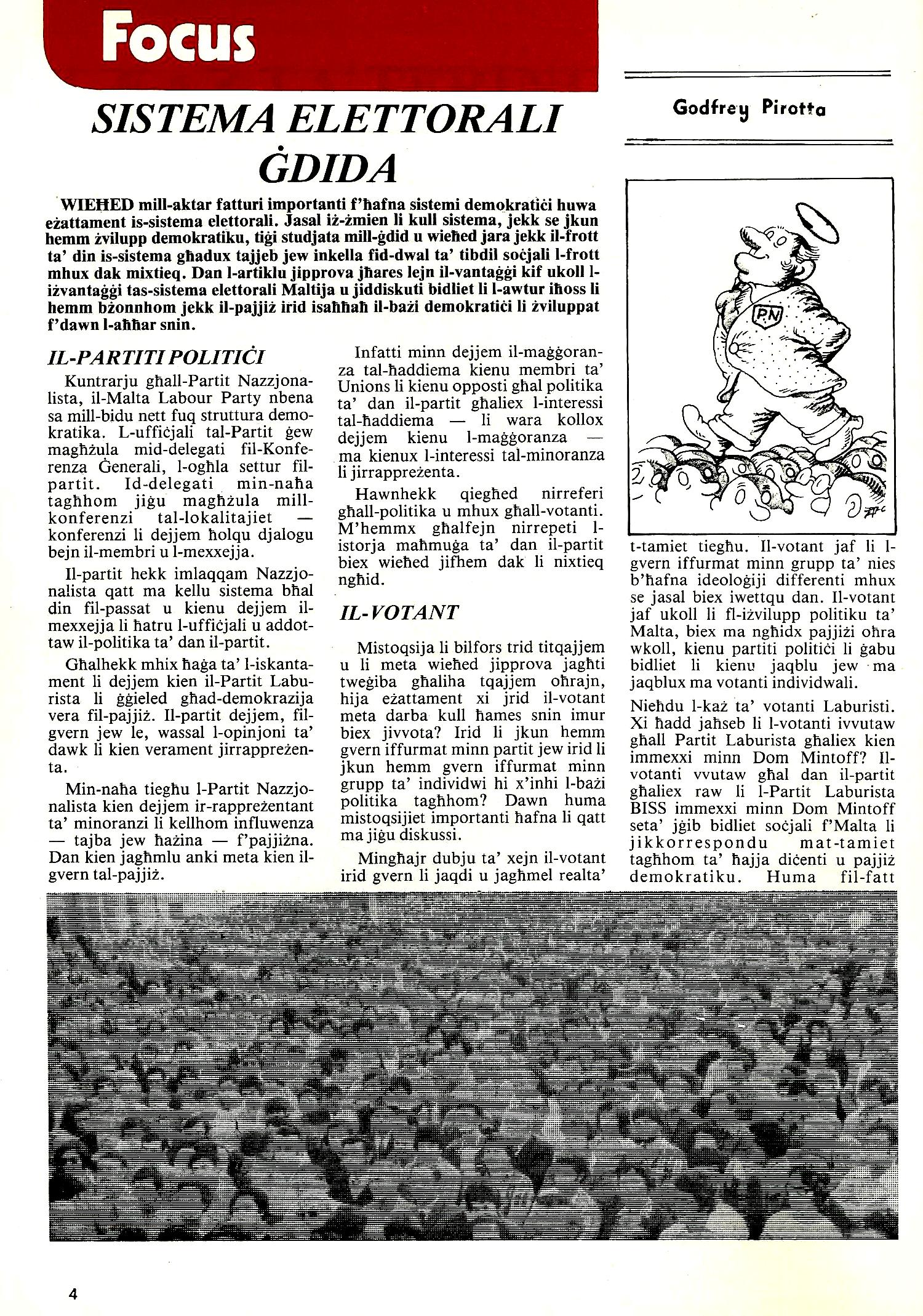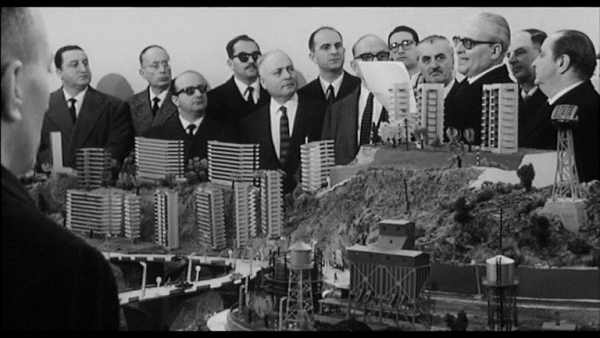
Maltese citizens need to abandon a hypocritical approach to politics. We need to sit down and have a rational debate on how to politically modernise our polity—this is what Malta needs most right now.
by Godfrey Anthony Pirotta
Image: still from The Godfather (1972), colorised & amended
Disclaimer: The author of this piece does not support the claim that Malta has ever experienced a golden age with no clientelism. On the contrary, after decades of research, he is convinced that clientelism could be a defining feature of these islands’ politics.
[dropcap]I[/dropcap] feel that the disclaimer above was necessary since I frequently come across statements claiming that clientelism is a recent development. I argue that it isn’t: clientelism has been present in Malta for at least 500 years. Indeed, the patron-client relationship that is so integral to Maltese society is the product of three principal factors: the miniscule size of the country, the Catholic religion and specific political processes.
The Small Catholic Country Set-Up
Malta’s small size sets the conditions for familiarity and access which allow us to build networks without even setting out to do so. “Do I know anyone who could help me?“ is a customary question most people living in Malta ask when facing a problem. Defined this broadly, one can say that the vast majority of the population in Malta has resorted to clientelism. Indeed, I will go as far as stating that only as few as 0.5% of the population has never resorted to clientelism and 98% of them are younger than 5 years old.
The issue is further complicated by extensive family bonds. In the 1990s I declined an invitation to contest an election on the grounds that I would overnight discover more relatives than I was aware of. In 1980, Dom Mintoff, fully conscious of my antipathy to our clientelism-based politics, advised me to never run for political office as I had no chance of being elected.
Religion has also played a strong part in the development of this client-patron relationship. People were brought up not only praying to patron saints but were also encouraged to regularly demonstrate their loyalty to the town/village patron saint.
People were brought up not only praying to patron saints but were also encouraged to regularly demonstrate their loyalty to the town/village patron saint.
Essentially, we grew up praying to these patron saints in order to find help: “St Rita, please help me win the Super 5”, “St Anthony, do find my lost car keys”, “Virgin Mary, cure me of my illness.” Over centuries these practices crystallised into Maltese sayings with a strong secular twist: “without the help of saints you will never get into heaven” and “if you do not pray you will never receive.”
These maxims could also be applied to the political sphere, as these sayings show: “if you do not cry you will not be breastfed”; “with money you can carve a road in the sea”; and “it is not what you know but who you know that counts”.
The traditional maxims did not come about accidentally but evolved in response to the economic and social environment in which the Maltese lived their daily lives. Depending on their social status, people could be either patrons or clients. Clients expected—and still do—that persons powerful enough to hold a patron status are capable of delivering when called upon.
Those approaching retirement age might remember how a town’s influential persons—with the Church by their side—exercised power on every activity in their area, be it a band club or their confraternities. Resisting them meant being excluded from the community. Accepting them was a way to maintain a functioning patron-client relationship in time of need.
A Brief History of Clientelism
Clientelism is no recent development. It existed under the Order of St John and the British administration too. In the 1850s, Governor Reid introduced competitive examinations for entry into the civil service to put an end, among other things, to the continuous stream of thousands of petitions from people seeking employment within the service. They did not stop.
The introduction of political party competition in 1921 forged a new avenue for patronage. Village/town patrons now transformed themselves into electoral patrons. The single transferable vote (STV) system—imposed on Malta by the British for the sake of keeping nationalism at bay—with its multi-member, multi-candidate districts became the new arena for competition between patrons. And parties sought out candidates known for their patron status to contest elections—and a new patron-client relationship based on votes commenced.

The saint in heaven had been gradually replaced by more accessible patrons on earth. Two examples may suffice to illustrate this: in May 1922, merely six months after the establishment of party government, a motion was brought before the Legislative Assembly accusing the government of having committed abuses in terms of promotions, transfers, payment of salaries and management of the civil service.
On the eve of the 1927 election, the Governor reported that, anticipating defeat, the incumbent party had employed several hundred labourers within the public service. By 1932 this clientelist approach to politics had become entrenched.
The 1987 amendments to the Constitution, which gave automatic victory to the party polling 50%+1 of the votes, in my opinion, simply made matters worse. Parties became hostages to an electorate that has no qualms about bargaining votes for favours and this can be attested by current and past politicians. Only recently, a politician declared his intention to withdraw from politics as he feels little more than a hostage to voters. A patron-client relationship is never one-sided but since 1987 the individual voter tipped the balance in its favour. And as parties strive to win voters, they are forced to make even bigger concessions to those prioritising individual interests over common good.
As parties strive to win voters, they are forced to make even bigger concessions to those prioritising individual interests over common good.
Worse still, the 1987 electoral changes did nothing to strengthen democracy in Malta nor did it answer for the need for strict proportionality. Indeed, we have had several governments that won a majority of votes but not a majority of seats. The reason for this is simple: there is and has always been gerrymandering in nearly every election and not just the 1981 election.
Political campaigning has also become costly and this in turn has made parties more dependent on donors with large vested interests. This is hardly a new phenomenon: it has simply become larger.
This state of affairs made me deeply skeptical about our STV system and how its functioning has been fashioned. In the April 1979 edition of il-Ħsieb—a Labour-leaning monthly for which I served as Chairman of the Editorial Board—I condemned this system as demeaning of the country and its population. During the 1979 Labour Party (MPL) general conference Mintoff made a reference to my article, expressing agreement with the argument, and pointing out that during the 1964 Independence Constitution talks in London the MPL had sought to change the electoral system but this was resisted by the Nationalist Party.
I raised the issue again in 1993 at Akkademja għall-Iżvilupp ta’ Ambjent Demokratiku (Academy for the Development of a Democratic Environment, AZAD) and kept bringing it up in several articles in It-Torċa and other newspapers. I have not yet changed my opinion.
Ways Forward?
So where do we go from here? The small size of this archipelago will always impact the way people relate to each other in Malta. Politicians and other potential patrons will always be easily accessible through informal routes. We cannot change that. And in certain kinds of situations—not least due to bureaucratic hurdles and hospital waiting lists—people will continue to seek avenues to satisfy urgent needs. And we should not waste our strength trying to discover an El Dorado which never existed nor will ever exist.
What we need to do, however, is seek solutions to the causes of the problem and not the symptoms, which in my view both the Venice and GRECO Commissions, notably the latter, could be accused of.

First, meritocracy can never thrive in a context of extreme clientelism. And while the need for meritocracy is discussed by academics and, worse still, by opposition speakers, none of them propose effective solutions—mainly because favours are not unwelcome when needed. The vast majority of people, regardless of their status, unashamedly take recourse to it.
Second, since winning power is a costly business, we cannot pretend to be so shocked by the dependency of Maltese politics on vested interests. Dependency can never lead to a high degree of transparency and accountability. The Labour Party in government has introduced several good governance reforms* yet criticism is growing more strident.
My concern is that strengthening meritocracy and transparency may not be a priority of the critics of the present government since this cannot be achieved without changing both our electoral system and our party funding system. While commentators and rapporteurs speak of the need for institutional and constitutional reform, failure to tackle these two issues would undermine such reforms.
Strengthening meritocracy and transparency may not be a priority of the critics of the present government since this cannot be achieved without changing both our electoral system and our party funding system.
Here are a few suggestions on how to weaken the grip of clientelism, if not completely dismantle it.
![]()
Electoral districts should be abolished and elections need to be held with one national constituency. This would only partially address the issue of clientelism, but under this system candidates would need to have a national standing and not merely the ability to secure a couple of thousands votes to be elected. This would strike a blow at the client-patron relationship at a district level but still won’t eliminate clientelism completely—political parties would seek individuals able to secure country-wide support.
My preference would be to abandon the STV completely and look for an alternative which would address our shortcomings, but this proposal would never get the support of the political parties.
![]()
Making Malta a single constituency, however, is not enough. Clientelism is also maintained by the large flows of financial transfers from businesses to political parties. The law on party financing is a step forward but as the ċedoli affair has shown, not enough. There is a need for a focused rational discussion on this issue.
Although I was skeptical about the idea of allocating public funds to party campaigning, I no longer see an alternative to that. But this, of course, has to be done under stringent conditions.
Although I was skeptical about the idea of allocating public funds to party campaigning, I no longer see an alternative to that. But this, of course, has to be done under stringent conditions.
First, the budget for public funding should be fixed for a duration of 10-15 years; some of these funds will be earmarked for candidates nominated by the Electoral Commission. Second, no money will be transferred to political parties directly, but rather the expenses would be refunded upon the presentation of valid receipts; eligible campaign expenses would be clearly defined in a legislation regulating the use of public funding of parties. Campaign expenditure which is not in line with the law will not be refunded.
![]()
Third, the funds allocated to campaigning will be subject to a strict audit by the National Audit Office. Fourth, parties and individual candidates will be prohibited from receiving any kind of donations—in cash or kind—from companies, directors of companies and people registered as self-employed. They would only be allowed to receive donations from individuals who do not fall within these categories and these donations must be of a low value. Fifth, parties or candidates who infringe the rules will automatically forfeit funding for the following election/candidacy.
The above are a few practical suggestions that could improve the political climate in Malta and weaken clientelism. Unfortunately, there seems to be little willingness to understand the real challenges this micro island state is facing. Instead of debate and understanding, we have had a great deal of posturing and hysterics and the waving of Commission reports. Maltese citizens need to abandon a hypocritical approach to politics. We need to sit down and have a rational debate on how to politically modernise our polity—this is what Malta needs most right now.
![]()
*The examples of the reforms introduced by the Labour government are: the removal of prescription in cases of alleged corruption by politicians, party-funding legislation, greater autonomy to Parliament and the appointment of a Standards in Public Life Commissioner.

Godfrey A. Pirotta is a graduate of the universities of Oxford, Reading and Bath. He currently holds the post of Professor of Government and Policy Studies and Chairperson of the Mediterranean Diplomatic Academy at the University of Malta. He is the author of three books on the history of governing institutions in Malta and of numerous chapters and articles on Maltese politics and public administration and a specialist on small states. He is a member of the advisory boards of the Anna Lindh Foundation for Multi-Cultural Dialogue and the International Policy Leadership Institute. He has been active at all levels of the Education system and has been awarded the title of Honorary Professor of Politics by two overseas universities.
Leave a Reply